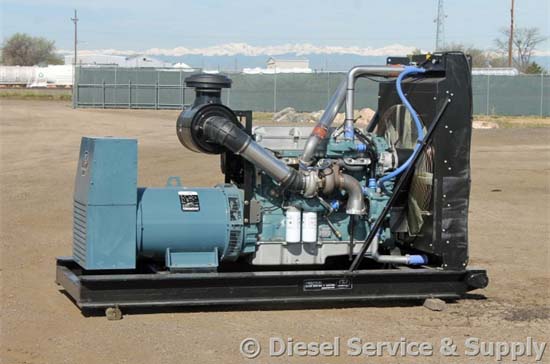EPA to Ease Alaska Generator Standards
Alaskan law makers work with the EPA to remove particulate matter standards for diesel generators.
Generator Emission Upgrades Not Required
Alaskans in remote communities uttered a sigh of relief with the last announcement from the Environmental Protection Agency (EPA). Alaska lawmakers worked with the EPA to roll back the requirement to use a particulate matter system for diesel engine powered generators.
In a statement to E&E News, Rep. Dan Young (Alaska) said, "New generators are very costly, and families shouldn't be burdened by an arbitrary decision made by bureaucrats 4,000 miles away." Remote communities are defined as those that do not receive Federal highway aid and/or not connected to the state electrical grid.
There are approximately 200 remote Alaskan villages that depend on generators powered by diesel engines or renewable energy (solar, wind, hydroelectric). Renewable energy powered villages depend on diesel powered generators for backup power.
What are Emissions Made of?
All combustion engines produce gases that contain the following monitored elements:
- Nitrogen Oxide (NOx) - Occurs when fossil fuels are burnt. Colorless non-toxic gas that is often called laughing gas.
- Hydrocarbons (HC) - Carbon and hydrogen compound with molecules ranging from methane to polymers.
- Carbon Monoxide (CO) - Colorless, orderless, toxic gas produced from unburned fuel.
- Particulate Matter (PM) - The sum of all solid and liquid particles in the exhaust produced from combustion.
It is important to understand that generators that are for in standby for emergency or backup operations are not required to meet the Environmental Protection Agency (EPA) Tier requirements. Emission requirements advanced as the production years increased. The EPA began with imposing Tier 1 emission requirements. This quickly moved to Tier 3 requirements which all generators that operate in prime or continuous mode must meet today.
Advancements in diesel engine design, fuel, and control systems maintain NOx, HC and CO levels in the exhaust gases for Tier 3 certification. Tier 4 systems require an additional system to control the particulate matter in the exhaust gases. Diesel Exhaust Fluid (DEF) system removes particulate matter in the exhaust gas by injecting liquid into the exhaust system. Go to
Emissions for Standby Generators for more information.
Generator Options for Off-Grid Communities
Remote communities are powered by renewable energy use diesel generators for emergency power. These generators can operate for an unlimited amount of time during utility outages caused by acts of nature such as floods and fires without EPA Tier certification.
These engines do not need to meet the stringent emissions requirements as those in prime and continuous modes. Villages that use generators as a primary or continuous power supply must adhere to the EPA Tier 3 emission requirements.
Indoor & Outdoor generators are the two types of generators developed for emergency, prime, and continuous power requirements.
Indoor Generators
Alternator (generator end) engine and cooling system are mounted on a skid. Ready to be moved into a building. This model does not commonly have a fuel tank. Usually, a day tank supplied by a main tank is the arrangement used. Exhaust must be routed through the building. The generator radiator must have outside air access or an aftermarket Heat Exchanger (HEX) installed to cool engine coolant.
Outdoor Generators
An outdoor generator can be located on any level surface that can withstand the weight and vibrations associated with generator operation. The complete generator unit is mounted on a skid with a fuel tank fabricated into the structure. A weather-resistant or weather-proof, sound attenuated enclosure surrounds the structure. Can be portable or stationary in design.
Both styles have the capability to operate in parallel for multiple generator configurations. Generator Source have been in the generator sales and service business for more than 35 years. Go to
Generator Sales or
Generator Service for more information.
Diesel Blog Team
| 12/1/2019 8:26:28 PM
|
0 comments